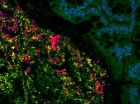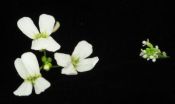(Press-News.org) PASADENA, Calif.—The human gut is filled with 100 trillion symbiotic bacteria—ten times more microbial cells than our own cells—representing close to one thousand different species. "And yet, if you were to eat a piece of chicken with just a few Salmonella, your immune system would mount a potent inflammatory response," says Sarkis K. Mazmanian, assistant professor of biology at the California Institute of Technology (Caltech).
Salmonella and its pathogenic bacterial kin don't look that much different from the legion of bacteria in our gut that we blissfully ignore, which raises the question: What decides whether we react or don't? Researchers have pondered this paradox for decades.
In the case of a common "friendly" gut bacterium, Bacteroides fragilis, Mazmanian and his colleagues have figured out the surprising answer: "The decision is not made by us," he says. "It's made by the bacteria. Since we are their home, they hold the key to our immune system."
What's more, the bacteria enforce their "decision" by hijacking cells of the immune system, say Mazmanian and his colleagues, who have figured out the mechanism by which the bacteria accomplish this feat—and revealed an explanation for how the immune system distinguishes between beneficial and pathogenic organisms.
In addition, the work, described in the April 21 issue of Science Express, "suggests that it's time to reconsider how we define self versus non-self," Mazmanian says.
Like other commensal gut bacteria—those that provide nutrients and other benefits to their hosts, without causing harm—B. fragilis was thought to live within the interior of the gut (the lumen), and thus far away from the immune system. "The dogma is that the immune system doesn't respond to symbiotic bacteria because of immunological ignorance," Mazmanian explains. "If we can't see them, we won't react to them."
But using a technique called whole-mount confocal microscopy to study the intestines of mice, he and his colleagues found that the bacteria actually live in a unique ecological niche, deep within the crypts of the colon, "and thus in intimate contact with the gut mucosal immune system," he says.
"The closeness of this association highlights that an active communication is occurring between the bacteria and their host," says Caltech postdoctoral scholar June L. Round.
From that vantage point, the bacteria are able to orchestrate control over the immune system—and, specifically, over the behavior of immune cells known as regulatory T cells, or Treg cells. The normal function of Treg cells is to prevent the immune system from reacting against our own tissues, by shutting down certain immune responses; they therefore prevent autoimmune reactions (which, when uncontrolled, can lead to diseases such as multiple sclerosis, type 1 diabetes, lupus, psoriasis, and Crohn's disease).
Bacteroides fragilis has evolved to produce a molecule that tricks the immune system into activating Treg cells in the gut, but in this case, Mazmanian says, "the purpose is to keep the cells from attacking the bugs. Beautiful, right?"
In their Science paper, Mazmanian and colleagues describe the entire molecular pathway that produces this effect. It starts with the bacteria producing a complex sugar molecule called polysaccharide A (PSA). PSA is sensed by particular receptors, known as Toll-like receptors, on the surfaces of Treg cells, thus activating those cells specifically. In response, Treg cells suppress yet another type of cell, the T helper 17 (Th17) cells. Normally, Th17 cells induce pro-inflammatory responses—those that would result, for example, in the elimination of foreign bacteria or other pathogens from the body. By shutting those cells down, B. fragilis gets a free pass to colonize the gut. "Up until now, we have thought that triggering of Toll-like receptors resulted solely in the induction of pathways that eliminate bacteria," says Round. "However, our studies suggest that multiple yet undiscovered host pathways allow us to coexist with our microbial partners."
When Mazmanian and his colleagues blocked this mechanism—by removing the PSA molecule, by removing the Toll-like receptor for PSA, or by eliminating the Treg cells themselves—the bacteria were attacked by the immune system and expelled. "They can no longer co-opt the immune system into inducing an anti-inflammatory response, so the formerly benign bacterium now looks like a pathogen," he says, "although the bug itself is exactly the same."
"Our immune system arose in the face of commensal colonization and thus likely evolved specialized molecules to recognize good bacteria," says Round. Mazmanian suspects that genetic mutations in these pathways could be responsible for certain types of immune disorders, including inflammatory bowel disease: "The question is, do patients get sick because they are rejecting bacteria they shouldn't reject?"
On a more philosophical level, Mazmanian says, the findings suggest that our concept of "self" should be broadened to include our many trillions of microbial residents. "These bacteria live inside us for our entire lives, and they've evolved to look and act like us, as part of us," he says. "As far as our immune system is concerned, the molecules made by gut bacteria should be tolerated similarly to our own molecules. Except in this case, the bacteria 'teaches' us to tolerate them, for both our benefit and theirs."
INFORMATION:
The other coauthors on the paper, "The Toll-like receptor 2 pathway establishes colonization by a commensal of the human microbiota," are S. Melanie Lee, Jennifer Li, and Gloria Tran of Caltech; Bana Jabri of the University of Chicago; and Talal A. Chatila of the David Geffen School of Medicine at UCLA. June L. Round was supported by a Jane Coffin Childs Memorial Fund postdoctoral fellowship. The work was supported by the National Institutes of Health, the Damon Runyon Cancer Research Foundation, and the Crohn's and Colitis Foundation of America.
Written by Kathy Svitil
Contact:
Deborah Williams-Hedges
debwms@caltech.edu
(626) 395-3227
Visit the Caltech Media Relations website at http://media.caltech.edu.
Caltech: Learning to tolerate our microbial self
2011-04-24
ELSE PRESS RELEASES FROM THIS DATE:
Protein Shakes - Part of Your Beach Body Diet by WheyProteinShakes.co.uk
2011-04-24
Protein shakes can help you to get that physique that you've always wanted and it's getting to that time of year again, when everybody is becoming worried about how they're going to look whilst they're on the beach during summer. Gyms are receiving an influx of new members, all enthusiastic and determined to get those abs they have always dreamed of. However, how many people are taking their diets seriously?
It is said that your diet accounts for 90% of your workout. What you eat can make the difference between those six pack abs or that flabby beer belly. Giving proper ...
Burps, Bibs, and Beyond Announces Several New Additions to Their Online Catalog for the Spring
2011-04-24
burps, bibs and beyond is pleased to announce that just in time for spring, they are expanding their product offerings with new hooded towels and baby blankets. burps, bibs and beyond, headquartered in Plantation, Florida, provides personalized baby gifts and accessories, such as trumpette socks, embroidered baby bibs, baby security blankets and accessories that make great gifts.
burps, bibs and beyond is pleased to introduce blankets by the renowned children's artist, Kelly B. Rightsell, with the theme "Sugar and Spice and Everything Nice" These blankets ...
Researchers find fat turns into soap in sewers, contributes to overflows
2011-04-24
Researchers from North Carolina State University have discovered how fat, oil and grease (FOG) can create hardened deposits in sewer lines: it turns into soap! The hardened deposits, which can look like stalactites, contribute to sewer overflows.
"We found that FOG deposits in sewage collection systems are created by chemical reactions that turn the fatty acids from FOG into, basically, a huge lump of soap," says Dr. Joel Ducoste, a professor of civil, construction and environmental engineering at NC State and co-author of a paper describing the research. Collection systems ...
EPO doping helps combat cerebral malaria
2011-04-24
Almost 3.3 billion people, half of the world's population, risk being infected with malaria. Despite having effective means against malaria, the WHO reports 250 million cases of malaria each year and more than 700,000 related deaths. Researchers at the University of Copenhagen have now discovered that EPO, the doping drug known from professional cycling, can significantly reduce cerebral malaria related deaths.
When more than 700,000 people die from malaria each year it is due to two grave complications, which the malaria parasites manage to cause before they are eliminated ...
What do you know about that fracture?
2011-04-24
A fracture in a person over the age of 50 can be a sign of osteoporosis, yet some patient populations have little knowledge of the disease. According to a groundbreaking study published in a recent Journal of Bone and Joint Surgery (JBJS), male and non-English speaking patients tend to have the least knowledge of osteoporosis, putting them at high risk for a subsequent fracture.
Osteoporosis is a contributing factor in as many as 1.5 million fractures each year. The risk of a serious fracture can double after a first fracture in certain high-risk groups. Additionally, ...
Mommy Appelseed is Thrilled to Announce the Launch of Pregnancy Prayers!
2011-04-24
As we strive to help pregnant women all over the world find that perfect pair of maternity jeans or that beautiful baby shower dress, we've decided to take a step closer to meeting pregnancy needs by taking prayer requests. Pregnancy is such a precious time in a women's life that every moment should be cherished with joy. However, due to difficult circumstances, enjoying your pregnancy can be hard to do.
Jesus taught, "...I tell you the truth, if you have faith as small as a mustard seed, you can say to this mountain, 'Move from here to there' and it will move. ...
Standing up for athletes at risk
2011-04-24
When a high school athlete drops dead, the rare but fatal condition called "sudden death syndrome" dominates the headlines. For reasons that remain a mystery to scientists, some young athletes — especially young males — begin to experience an unusual heart arrhythmia. With over-exertion, their hearts stop pumping, leading to sudden death.
Until now, screening for the hard-to-detect syndrome has been prohibitively expensive. But cardiologist Dr. Sami Viskin of Tel Aviv University's Sackler Faculty of Medicine has developed a new test that's already being used by doctors ...
Evolution can cause a rapid reduction in genome size
2011-04-24
It would appear reasonable to assume that two closely related plant species would have similar genetic blueprints. However, scientists from the Max Planck Institute for Developmental Biology in Tübingen, working in cooperation with an international research team have now decoded, for the first time, the entire genome of the lyre-leaved rock cress (Arabidopsis lyrata), a close relative of the thale cress (Arabidopsis thaliana), the model plant used by geneticists. They discovered that the genome of the lyre-leaved rock cress is fifty percent bigger than that of the thale ...
Happiest places have highest suicide rates says new research
2011-04-24
The happiest countries and happiest U.S. states tend to have the highest suicide rates, according to research from the UK's University of Warwick, Hamilton College in New York and the Federal Reserve Bank of San Francisco.
The new research paper titled Dark Contrasts: The Paradox of High Rates of Suicide in Happy Places has been accepted for publication in the Journal of Economic Behavior & Organization. It uses U.S. and international data, which included first-time comparisons of a newly available random sample of 1.3 million Americans, and another on suicide decisions ...
Collar Planet of Tampa Florida Announces Addition of the Supercoller Leash and Collar System to Their Online Catalog
2011-04-24
Collar Planet, Tampa Florida's luxury pet boutique, has announced the addition of the supercoller Leash and Collar System to their Online Catalog
The supercoller is a hybrid dog collar and leash system all-in-one, designed to replace the traditional separate collar and leash. Convenience and control are what this unique alternate will provide to dog owners. The supercoller offers the convenience of a built in leash that retracts and attaches to the collar when not in use. Each cable of the built in leash is manufactured to handle 100lbs. The supercoller is made for dogs ...





